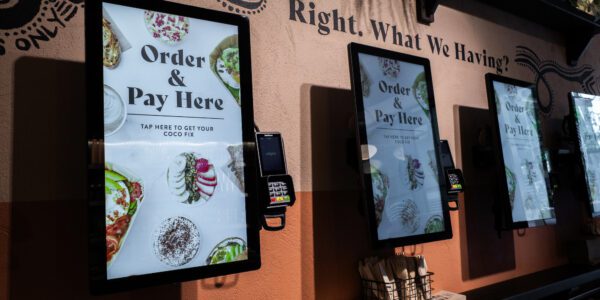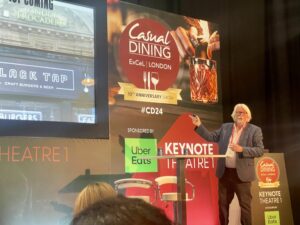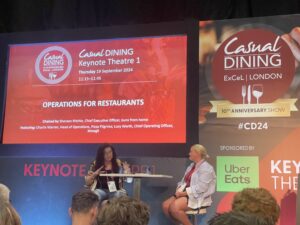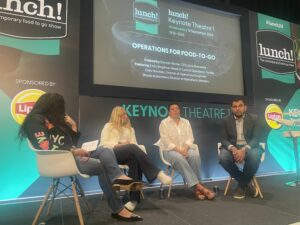7 incredible benefits of using self service kiosks in your restaurant
Self serve kiosks aren’t just for McDonalds any more. Discover the financial and operational benefits of kiosks and why they might be right for your restaurant.

Learn insights, tips and tricks from the experts at the biggest event in hospitality’s calendar…
After a challenging few years, restaurant leaders are broadly optimistic about growth and opportunities.
September is a big month for the hospitality as the industry hits the ExCel in London for lunch! and the Casual Dining Show.
Here are some key takeaways from the many panels, interviews, and informal chats across the events that can help you gauge the temperature of the hospitality sector right now.
Restaurants are spying plenty of growth opportunities. People might be going out less, but they’re spending more. Pessimism is declining and 36% of businesses are confident in the market – according to Peter Martin of Peach 2020.
“Like for like sales is staying positive,” Martin says. “Younger people (under 34) are going out much more often,” he adds.

Shannon Goldsmith, Senior Insight Analyst at IGD also sees solid growth in the
Market. She expects food-to-go to exceed £30b by 2028, and for real growth to outstrip inflation. Coffee and drinks continue to fair well, too, with these items predicted to grow by 30.4% by 2029.
“I’m feeling better about the world,” Jason Cotta, Chief Growth Officer at Itsu says. “The change of government will help. We should see a slight improvement in the country’s economics over the next year. Not tomorrow. Not next week. But long term.”
Costs – including labour, rents and business rates – continue to hit restaurants hard.

Household names such as Burger King are even facing challenges. “We’re lucky that we have the scale to mitigate that,” CEO Alasdair Murdoch says. “Our labour rates have been increasing, and they will continue rising at that rate.”
“I do not doubt that it the living wage will continue to rise well above inflation,” he adds. “The unintended consequence is that we’ll work out how to drive productivity and what you end up doing is hiring fewer people. We’re keen to pay a fair wage. That’s the correct thing to do. But you need to think of the consequences further down the line.”
Allan Simpson, Deputy Chief Executive Officer at UKHospitality, is making the case to the government that they continue business rate relief beyond April 1st 2025.

And it should be for restaurant businesses too.
Shannon Goldsmith points to some interesting stats for new health opportunities. With 50% of food-to-go consumers being satisfied with the range of healthy options available, things are looking positive, but there is plenty to build on.
Spencer Craig, Founder and CEO of Pure, reminds us that health can mean different things to different people: “Might be allergies, might be cultural, might be fitness, low carbs, organic. It means a lot of different things.”
Itsu’s Chief Growth Officer Jason Cotta anticipates more interventions from the government where promoting healthier lifestyles is concerned.
“The NHS is underperforming and underfunded,” he says. “Whatever they can do in the long run that reduces the impact on the health service they will do. If they were to, say, start capping calories on dishes, that would give our industry a massive challenge. As a direction of travel, it’s much more likely now than it was before.”
Operational agility and integration of new technologies were also big talking points.
“You have to be able to innovate,” Shereen Ritchie says. “There are amazing brands out there winning at the moment, because they’ve found a way to be authentic but innovative. Turbulent times are the new normal.”
Charlie Warren, Head of Operations at Pizza Pilgrims, speaks about price sensitivity and the need to be quick to respond to bad experiences.
“The only time we get questioned about price is when we’ve not delivered on what we’ve promised,” she says. “If there was a grumpy team member, or the sites weren’t clean enough. When we don’t deliver what we want to deliver, that’s when the question of price might come up.”

Being able to make things right quickly is one part of being agile. But so is being on the front foot when it comes to reaching and engaging with new customers.
For Shannon Goldsmith, this is partly about being visible in new locations – and using digital kiosks or vending machines to capture passing footfall. It also might be about the product.
For instance, launching new caffeine-free, specialist drinks to target younger consumers – and reacting to social media trends.
When it comes to technology, Peach 2020’s Peter Martin reminds us that customers like tech if it improves the experience. Especially if they can order and get the bill quickly. Real-time data is also key to acting quickly, as noted by Itsu’s Jason Cotta: “Your ability to collect data through your apps, you can link that to the kiosk. We’re able to use that to leverage menu development.
Another focal point for the hospitality industry in 2024 is workplace culture. A positive workplace experience for staff makes for a positive customer experience for your guests.
But it has to be authentic.
“The most important thing in our industry is the people,” Shereen Ritchie says. “If you look after the people, everything else follows.”
For Ritchie, culture always comes from the top. A good example of progressive action – in the case of Buns From Home – is working to get more women on boards.
“As you go up and get more into leadership roles the dilution and diversity is where we have a massive problem,” she adds. “It’s something that we need, as an industry, to get behind. You’re going to fix some of the turbulence in the industry by having women leaders.”
A positive work culture leads to better staff retention. This is fundamental to being a competitive business today, but is also crucial if you want to scale up tomorrow.
Peter Martin points to a number of things that staff want in 2024: flexibility, communication via mobile, recognition for good work, training (via digital channels) and – of course – more competitive wages.

For Shoaib Mohammad, Director of Operations at Wendy’s, retention remains a challenge.
But it is certainly achievable if you are working with staff and helping them grow as the business does.
“We’re doing a lot of work getting culture aligned to where we want to be as we grow.” he says. “Showing that warmth, transparency and credibility in everything we do.”

“It’s important for them to feel you’re there for them, not against them,” he adds. “it can be difficult but if you have those honest conversations, people will respect you for it.”
Discover how ambitious brands are overcoming limited labour resources and building strong teams.
Learn from trailblazers including Tommy Giraux from Honest Burgers and David Ellison from Deep Blue Restaurants.
Self serve kiosks aren’t just for McDonalds any more. Discover the financial and operational benefits of kiosks and why they might be right for your restaurant.

Learn the benefits of centralising your hospitality data, and how easy-to-read, real-time reports will help you scale your business.

Innovating Hospitality: Lessons from the Retail Sector
